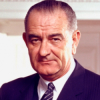Lyndon B. Johnson

Lyndon B. Johnson
Lyndon Baines Johnson, often referred to as LBJ, was the 36th President of the United States from 1963 to 1969, assuming the office after serving as the 37th Vice President of the United States under President John F. Kennedy, from 1961 to 1963. Johnson was a Democrat from Texas, who served as a United States Representative from 1937 to 1949 and as a United States Senator from 1949 to 1961. He spent six years as Senate Majority Leader, two as...
NationalityAmerican
ProfessionUS President
Date of Birth27 August 1908
CountryUnited States of America
We must open the doors of opportunity.
Doing what's right isn't the problem. It is knowing what's right.
Art is a nation's most precious heritage. For it is in our works of art that we reveal to ourselves and to others the inner vision which guides us as a nation. And where there is no vision, the people perish.
If we are to live together in peace, we must come to know each other better.
I am concerned about the whole man. I am concerned about what the people, using their government as an instrument and a tool, can do toward building the whole man, which will mean a better society and a better world.
If two men agree on everything, you may be sure that one of them is doing the thinking.
I have learned that only two things are necessary to keep one's wife happy. First, let her think she's having her own way. And second, let her have it.
If one morning I walked on top of the water across the Potomac River, the headline that afternoon would read: 'President Can't Swim.'
Our society is illuminated by the spiritual insights of the Hebrew prophets. America and Israel have a common love of human freedom, and they have a common faith in a democratic way of life.
The land flourished because it was fed from so many sources--because it was nourished by so many cultures and traditions and peoples.
As man draws nearer to the stars, why should he not also draw nearer to his neighbor?
It is happily and kindly provided that in every life there are certain pauses, and interruptions, which force consideration upon the careless, and seriousness upon the light, points of time where one course of action ends and another begins.
We have talked long enough in this country about equal rights. It is time now to write the next chapter - and to write it in the books of law.
If future generations are to remember us more with gratitude than sorrow, we must achieve more than just the miracles of technology. We must also leave them a glimpse of the world as it was created, not just as it looked when we got through with it.